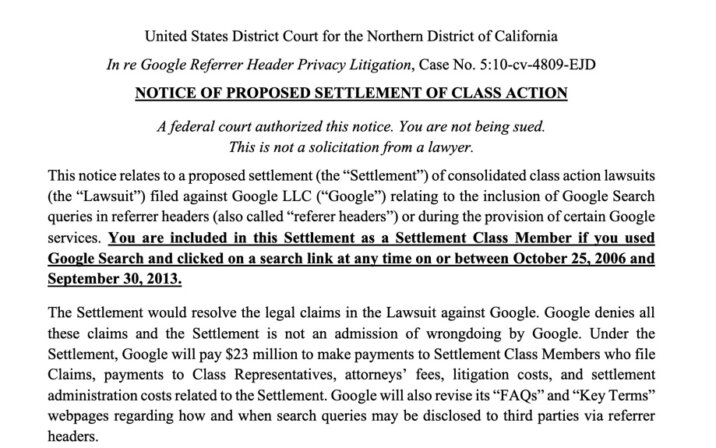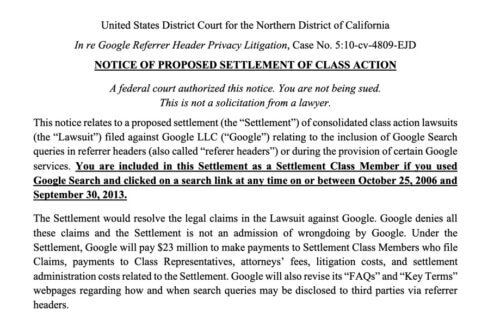
If you’ve heard about the recent Google class action settlement, you may be wondering if it’s real (yes, it’s real), whether you yourself qualify to receive any money from the settlement fund (yes, likely, but you have to register for it), and how much you’ll get (best estimates are somewhere between $7 and $8).
The reason that we can say that you likely qualify for a payout under this class action settlement is because both the wrongdoing of which Google is accused is so broad (affecting anyone who used Google to perform a search during the dates in question), and the dates are also so broad (any time between October 25, 2006 and September 30, 2013). Is there anyone who didn’t use Google to search something – not even once – during that nearly seven year period?
So what is the lawsuit about? Basically, as USA Today explains (always a good source for dumbed down explanations of stuff), if you used Google to search for anything between October 25th, 2006 and September 30th, 2013, Google shared your search information with third-party websites. For example, if you used Google to search for “widgets for changing an oil filter”, and then clicked on one of the websites that came up as a result of your search (let’s say it’s Acme.com), when you hit Acme’s website Google was telling Acme “this user searched for ‘widgets for changing an oil filter’ “. This of course is very valuable information for Acme, who can now target you with their ads for widgets, or ads for oil filters, or both.
That private information was contained in what is known as a “referrer header”, and, in fact, this particular class action settlement title is In re Google Referrer Privacy Litigation. (The original case was Paloma Gaos and Anthony Italiano v. Google Inc..)
The thing is, of course, that you never gave Google permission to share that with Acme, nor did you give Acme permission to receive this private information of yours. And rather than risk going to trial, Google agreed to settle.
The Internet Patrol is completely free, and reader-supported. Your tips via CashApp, Venmo, or Paypal are appreciated! Receipts will come from ISIPP.
Once a settlement is reached, a settlement administrator is appointed to, well, administer the settlement. Basically what this means is that the settlement administrator sends out notices to all people who potentially qualify for a piece of the settlement pie (these are called “members of the class” or “class members”, hence “class action lawsuit”), to keep track of those who register for a piece of that pie and to make sure that those who register qualify and then get their piece of pie (now we’re hungry and want pie).
While generally the fewer people who register the bigger that piece of pie, the settlement administrator for this particular class action settlement is estimating that each person will get $7.70. That’s seven dollars and seventy cents. Given that, according to the settlement document, Google agreed to cough up $23million to settle this case, even if the lawyers get 50% of the settlement, that leaves $11.5million to split among the members of the class, meaning that the administrator anticipates 14,935,064 people to register to get their share of that settlement pie.
If you’d like to be one of them you can register at refererheadersettlement.com. Once you register you will be emailed your class member identification number, which you will need to file your claim at this other page on the site. You must register your claim before July 31, 2023.
{Note that during the above process you will be subjected to at least 3 and as many as 6 of those infernal “Click all the squares that have a bicycle” captchas to prove that you are not a robot. For comic relief, and a guaranteed laugh laugh, we highly recommend John Mulaney’s short bit about the robot test captchas.}
The Internet Patrol is completely free, and reader-supported. Your tips via CashApp, Venmo, or Paypal are appreciated! Receipts will come from ISIPP.










